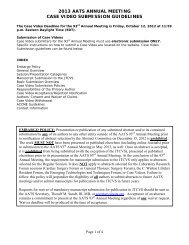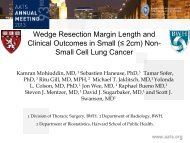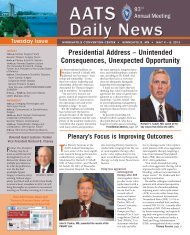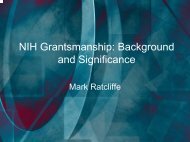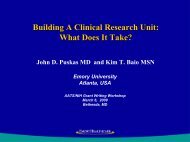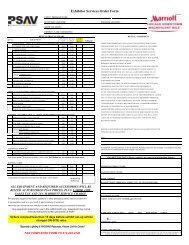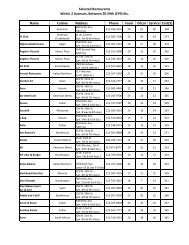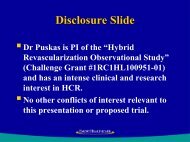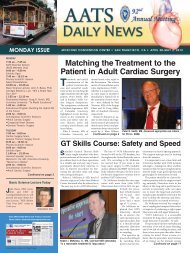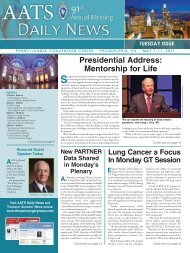Boston - American Association for Thoracic Surgery
Boston - American Association for Thoracic Surgery
Boston - American Association for Thoracic Surgery
- No tags were found...
You also want an ePaper? Increase the reach of your titles
YUMPU automatically turns print PDFs into web optimized ePapers that Google loves.
89 TH ANNUAL MEETING MAY 9–MAY 13, 2009BOSTON, MASSACHUSETTS42. Extracorporeal Membrane Oxygenation in Pediatric LungTransplantationVarun Puri, 1† Deirdre Epstein, 1 Steven C. Raithal, 1 Sanjiv K. Gandhi, 1*Stuart C. Sweet, 2 Albert Faro, 2 Charles B. Huddleston 1*1. Division of Cardiothoracic <strong>Surgery</strong>, Washington University, St. Louis, MO, USA;2. Department of Pediatrics, Washington University, St. Louis, St. Louis, MO, USAInvited Discussant: Victor MorellOBJECTIVE: To study Extracorporeal Membrane Oxygenation (ECMO) supportin the perioperative period in pediatric lung transplantation (LTx).METHODS: Review of an institutional database of pediatric LTx from 1990 to 2008.RESULTS: Three hundred <strong>for</strong>ty-two patients underwent LTx over the study period.Thirty-three of 342 (9.6%) patients required ECMO support in the perioperative period.Fifteen patients (mean age 2.7 ± 4.4 years) required 16 ECMO runs in the pretransplantperiod (PRE). Their diagnoses were; Pulmonary hypertension n = 4, Surfactantdeficiency n = 3, Graft failure n = 3, others n = 4. The indications <strong>for</strong> ECMO wererespiratory failure 8/16 (50%), severe pulmonary hypertension 5/16 (31%) and cardiopulmonarycollapse 3/16 (19%). Vascular access was V-A (veno-arterial) (16/16,100%) with neck vessels the preferred cannulation site (14/16, 87%). Mean durationof ECMO support was 226 ± 159 hours. All patients survived through LTx and 4/15(27%) required ECMO support postoperatively. The mean time to LTx from institutionof ECMO was 516 ± 631 hours and 6/15 (40%) patients were weaned off ECMOprior to LTx. Six of 15 (40%) PRE patients survived to hospital discharge. Complications(sepsis, reexploration and massive bleeding) were seen in 10/16 (63%)ECMO runs. Survival to discharge was higher in patients weaned off ECMO priorto LTx (4/6, 66%) than patients on ECMO going into LTx (2/9, 22%). All PREpatients requiring ECMO support postoperatively, or undergoing redo LTx died.Twenty-two patients (mean age 8.9 ± 7.5 years) underwent 24 ECMO runs afterLtX (POST). Their diagnoses were; Cystic fibrosis n = 6, Pulmonary hypertension n= 5, Obliterative bronchiolitis n = 4 and others n = 7. The indications <strong>for</strong> ECMOsupport were; Primary graft dysfunction 16/24 (67%), pneumonia 4/24 (16%) andothers 4/24 (16%). The mean time between LTx and institution of ECMO was 222± 312 hours. Access was predominantly V-A (23/24, 96%) and mean duration ofECMO support was 158 ± 125 hours. Four of 22 (18%) patients survived to hospitaldischarge (median survival 5.8 years). Amongst the non-survivors, the causes ofdeath were intractable respiratory failure (13/18, 72%) and infectious complications(3/18, 17%). No specific risk factors were identified to predict poor outcomesin the POST group.CONCLUSION: The need <strong>for</strong> perioperative ECMO support is associated with significantmorbidity and mortality in pediatric LTx. A subset of patients who can beweaned off ECMO in the preoperative setting have greater likelihood of survival.* AATS Member† Resident Traveling Fellowship 2008174



